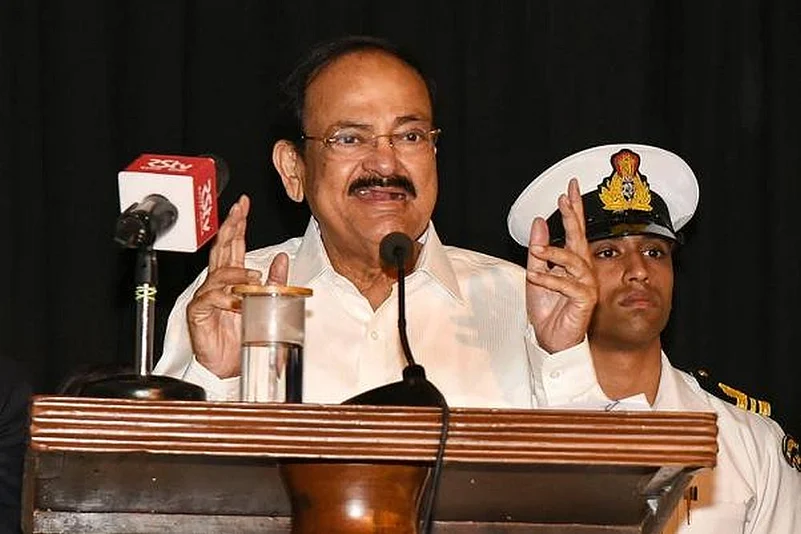Vice President M Venkaiah Naidu on Tuesday expressed concern over poor attendance of lawmakers and batted for a "roster system" to ensure attendance of at least 50 per cent members of each political party every day.
Political parties need to evolve a "roster system" for ensuring attendance of at least 50 per cent of their members in the legislatures all through the proceedings of the House every day to address the issue of lack of quorum, Naidu said.
"Legislature parties should ensure that the new entrants and backbenchers are given adequate opportunities to participate in the debates instead of fielding only a select and established few," he added.
Delivering the first Arun Jaitley Memorial Lecture instituted by the Delhi University, he praised the Constitution and the parliamentary system and said despite naysayers casting doubt over its efficacy in the initial days, it has strengthened the democracy of the country in the last nearly seven decades. But he lamented the declining quality of debates in the parliament.
In his address, he also pitched for instituting a "special bench" to ensure time-bound adjudication on criminal cases against politicians fighting elections.
"Politicians having criminal cases fight elections years after years. There's need for a system, a special bench to expedite those pending cases," Naidu said.
The vice-president expressed concerns over the functioning of parliamentary institutions in the country, even as he suggested a broad framework of reforms for further strengthening the parliamentary institutions to enhance the trust of the people in them.
"Based on the experience of the last 67 years of our parliamentary democracy, we need to evolve a new normal for our parliamentary institutions so that our nation can make up for the lost time and opportunities," he said.
The vice president also said that the representation of women in legislatures needs to be raised, which at present is only about 13 per cent.
He lamented the reduced sittings in Parliament and said the 16th Lok Sabha held 331 sittings during the five years, while the Rajya Sabha sat for 329 days in the same period.
"The declining number of sittings of Parliament from over 100 per year in the 50s and 60s to 60-70 days per year later has been sought to be addressed with the introduction of department-related standing committees in 1993," he said.
"A minimum number of sittings for both Parliament and state legislatures per year should be appropriately prescribed and compliance be ensured," Naidu suggested, adding that, "Lawmakers should abide by the rules of the House and political parties should take responsibility in this regard by evolving and enforcing a code of conduct."
"However, the pitfalls of Parliament have slowly come to mark the functioning of the department-related standing committees in the form of poor attendance, lack of specialisation, frequent committee hopping, etc. which need to be addressed," he said.
Naidu said he would discuss with the Lok Sabha speaker the measures needed for the effective functioning of these committees with longer tenure instead of the present one year, promoting specialisation by nominating the members for a longer period.
"Frequent disruptions, points of order without a point, adjournment motions and interruptions betrays political immaturity, exhibitionism, excessive fondness for the limelight and inadequate appreciation of the need to utilise the opportunity of serving the public interest," the vice president said.
With regard to disruptions, Rajya Sabha has lost 40 per cent of the available time of the House during 2014-2019, while the 16th Lok Sabha in the same period lost 16 per cent of the time, he rued.
Among other suggestions, he said both pre and post-legislative impact assessment should be ensured for quality and informed lawmaking.
The vice president said functioning of the anti-defection law needs to be reviewed, besides stipulating specific time-frame for deciding on defection matters by the presiding officers of legislatures.


























